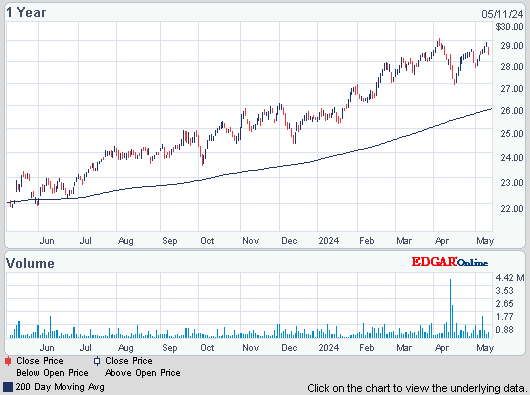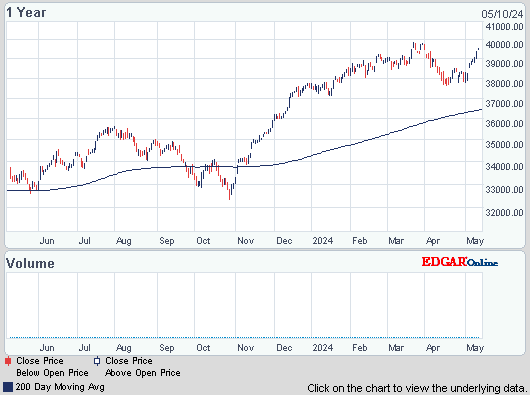Dow gained 67, advancers over decliners 2-1 & NAZ rose 33. The Financial Index was up 1+ to the 193.(2 below its monthly high).
The MLP index added 1 to the 363s & the REIT index was up a fraction in the 252s. Junk bond funds were higher & Treasuries fell back, raising the yield on the 10 year Treasury to the highest level this month. Oil & gold rose from bargain hunters.

![Live 24 hours gold chart [Kitco Inc.]](http://www.kitco.com/images/live/gold.gif)


Photo: Bloomberg
James Bullard, St. Louis Federal Reserve Bank President, said today a possible 3rd round of quantitative easing would face a “pretty high hurdle.” “We can do that and I think it would be effective,” Bullard said on Bloomberg Surveillance. “But we’d be taking a lot more risk on our balance sheet. We’d be going further into uncharted territory.” The Federal Reserve (FED) has already bought $2.3T of securities (a whopper size amount) in 2 quantitative-easing programs. Ben Bernanke signaled the FED will probably add to its record stimulus should the economy fail to make sufficient progress in creating jobs for 12.7M unemployed. The FOMC just extended its Operation Twist program & said it will swap $267B in short-term securities with longer-term debt thru the end of 2012. “It’s a continuation of the existing policy,” said Bullard. “The committee felt that it was maybe a bit imprudent to end the twist program right at this particular juncture. The committee has kind of been haunted by having end dates on programs and it seems like the end dates never occur at the right moment.” Operation Twist was to have ended this month. Bullard said that “Treasury yields have gone to extraordinarily low levels. That took some of the pressure off the FOMC since a lot of our policy actions would be trying to get exactly that result.” The latest thinking from a FED official.
Fed’s Bullard Says QE3 Would Have ‘High Hurdle’

Photo: Bloomberg
German business confidence fell to the lowest in more than 2 years in Jun as the worsening sovereign debt crisis clouded the economic outlook. The Ifo institute said today its business climate index, based on a survey of 7K executives, dropped for a 2nd straight month to 105.3 from 106.9 in May, the lowest reading since Mar 2010. The forecast was for a decline to 105.6. In a separate report, Italian consumer confidence fell to a record low. Policy makers are struggling to contain a debt crisis that has now forced Spain into seeking aid for its banks. While exports to countries outside the euro area have helped Germany to weather the crisis, latest data show growth is weakening as austerity measures across the region curb demand. A survey of purchasing managers yesterday shows German manufacturing is contracting at the fastest pace in 3 years. Exports, factory orders & industrial production all dropped in Apr & investor confidence plunged in Jun. The benchmark Dax index lost 11% in the last 3 months. Ifo’s gauge of current economic conditions rose to 113.9 from 113.2, while its measure of executives’ expectations dropped to 97.3 from 100.8. In Italy, an index of consumer confidence fell to 85.3 in Jun, the lowest since the data series began in 1996, from 86.5 in May. EU leaders meet next week to try to resolve competing visions over how to reshape the euro economy, with Germany & its fiscally disciplined neighbors unwilling to foist additional burdens on their taxpayers.
German June Business Confidence Drops to Two-Year Low
Spain will carry out another stress test of its banks by Oct with a focus on 7 lenders. This gives Spain at least 2 more months to negotiate for direct cash injections into lenders as part of a European aid package of up to €100B ($125B), designed to keep the country from sinking deeper into the euro zone debt crisis. The gov is fighting to avoid taking on the aid itself & then channeling it to the banks, which would affect the public debt & potentially ramp up borrowing costs. Economy Minister Luis de Guindos said direct European aid for the banks was still an option although euro zone nations had initially ruled it out. 2 banks said they would not need to tap any public funds & insisted they would be in a position to strengthen their capital with their own resources. However, a source from the economy ministry said it was too soon to draw conclusions on the needs of the banks. The source also said the gov would not enact a new set of capital requirements for the entire banking sector, because the plan is to target individually those lenders struggling to meet the new demands. The gov decreed in Feb & May steep provisioning requirements forcing all banks to recognize future losses on property loans & assets. The gov intends to keep all banks running & protect bondholders from any loss on their investments, he said. The banking situation remains fluid.
Spain to Stress Test Banks Again Reuters
Today's rally had very little oomph behind it on low volume with a tiny bit of selling at the close. Representative of this market, Walgreen (WAG), a Dividend Aristocrat, dropped 4½ this week after announcing it was buying a British pharmacy chain. In the last couple of days, it bounced back 1, but still has a dismal chart for the last year. Dow ended about even on the week after gaining 650 in the prior 2 weeks. Next week will close the month & Q2 which can lead to moves which are hard to explain. One thing not hard to explain is that Dow is off 550 in Q2 after an extremely strong Q1. Advances are tough to come by because global economies are just muddling by.

The MLP index added 1 to the 363s & the REIT index was up a fraction in the 252s. Junk bond funds were higher & Treasuries fell back, raising the yield on the 10 year Treasury to the highest level this month. Oil & gold rose from bargain hunters.
AMJ (Alerian MLP Index tracking fund)
Click below for the latest market update:
Treasury yields:
U.S. 3-month | 0.076% | |
U.S. 2-year | 0.303% | |
U.S. 10-year | 1.669% |
| CLQ12.NYM | ...Crude Oil Aug 12 | ...79.73 | ... | (2.0%) |
![Live 24 hours gold chart [Kitco Inc.]](http://www.kitco.com/images/live/gold.gif)


James Bullard, St. Louis Federal Reserve Bank President, said today a possible 3rd round of quantitative easing would face a “pretty high hurdle.” “We can do that and I think it would be effective,” Bullard said on Bloomberg Surveillance. “But we’d be taking a lot more risk on our balance sheet. We’d be going further into uncharted territory.” The Federal Reserve (FED) has already bought $2.3T of securities (a whopper size amount) in 2 quantitative-easing programs. Ben Bernanke signaled the FED will probably add to its record stimulus should the economy fail to make sufficient progress in creating jobs for 12.7M unemployed. The FOMC just extended its Operation Twist program & said it will swap $267B in short-term securities with longer-term debt thru the end of 2012. “It’s a continuation of the existing policy,” said Bullard. “The committee felt that it was maybe a bit imprudent to end the twist program right at this particular juncture. The committee has kind of been haunted by having end dates on programs and it seems like the end dates never occur at the right moment.” Operation Twist was to have ended this month. Bullard said that “Treasury yields have gone to extraordinarily low levels. That took some of the pressure off the FOMC since a lot of our policy actions would be trying to get exactly that result.” The latest thinking from a FED official.
Fed’s Bullard Says QE3 Would Have ‘High Hurdle’

German business confidence fell to the lowest in more than 2 years in Jun as the worsening sovereign debt crisis clouded the economic outlook. The Ifo institute said today its business climate index, based on a survey of 7K executives, dropped for a 2nd straight month to 105.3 from 106.9 in May, the lowest reading since Mar 2010. The forecast was for a decline to 105.6. In a separate report, Italian consumer confidence fell to a record low. Policy makers are struggling to contain a debt crisis that has now forced Spain into seeking aid for its banks. While exports to countries outside the euro area have helped Germany to weather the crisis, latest data show growth is weakening as austerity measures across the region curb demand. A survey of purchasing managers yesterday shows German manufacturing is contracting at the fastest pace in 3 years. Exports, factory orders & industrial production all dropped in Apr & investor confidence plunged in Jun. The benchmark Dax index lost 11% in the last 3 months. Ifo’s gauge of current economic conditions rose to 113.9 from 113.2, while its measure of executives’ expectations dropped to 97.3 from 100.8. In Italy, an index of consumer confidence fell to 85.3 in Jun, the lowest since the data series began in 1996, from 86.5 in May. EU leaders meet next week to try to resolve competing visions over how to reshape the euro economy, with Germany & its fiscally disciplined neighbors unwilling to foist additional burdens on their taxpayers.
German June Business Confidence Drops to Two-Year Low
Spain will carry out another stress test of its banks by Oct with a focus on 7 lenders. This gives Spain at least 2 more months to negotiate for direct cash injections into lenders as part of a European aid package of up to €100B ($125B), designed to keep the country from sinking deeper into the euro zone debt crisis. The gov is fighting to avoid taking on the aid itself & then channeling it to the banks, which would affect the public debt & potentially ramp up borrowing costs. Economy Minister Luis de Guindos said direct European aid for the banks was still an option although euro zone nations had initially ruled it out. 2 banks said they would not need to tap any public funds & insisted they would be in a position to strengthen their capital with their own resources. However, a source from the economy ministry said it was too soon to draw conclusions on the needs of the banks. The source also said the gov would not enact a new set of capital requirements for the entire banking sector, because the plan is to target individually those lenders struggling to meet the new demands. The gov decreed in Feb & May steep provisioning requirements forcing all banks to recognize future losses on property loans & assets. The gov intends to keep all banks running & protect bondholders from any loss on their investments, he said. The banking situation remains fluid.
Spain to Stress Test Banks Again Reuters
Today's rally had very little oomph behind it on low volume with a tiny bit of selling at the close. Representative of this market, Walgreen (WAG), a Dividend Aristocrat, dropped 4½ this week after announcing it was buying a British pharmacy chain. In the last couple of days, it bounced back 1, but still has a dismal chart for the last year. Dow ended about even on the week after gaining 650 in the prior 2 weeks. Next week will close the month & Q2 which can lead to moves which are hard to explain. One thing not hard to explain is that Dow is off 550 in Q2 after an extremely strong Q1. Advances are tough to come by because global economies are just muddling by.
Dow Jones Industrials
Get your favorite symbols' Trend Analysis TODAY!


No comments:
Post a Comment